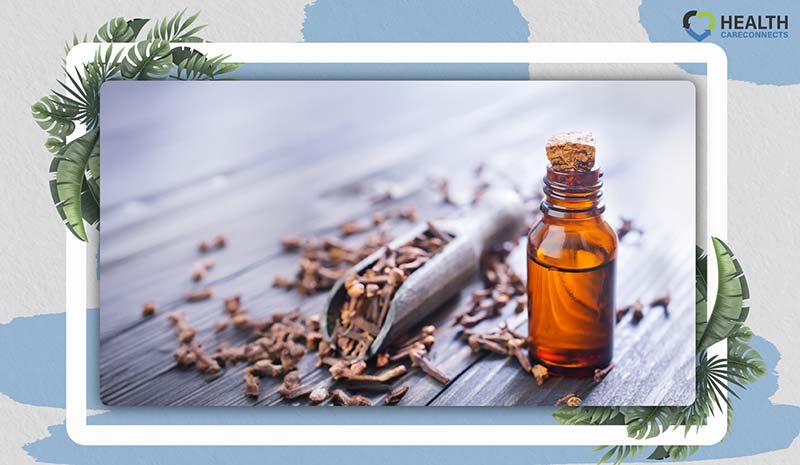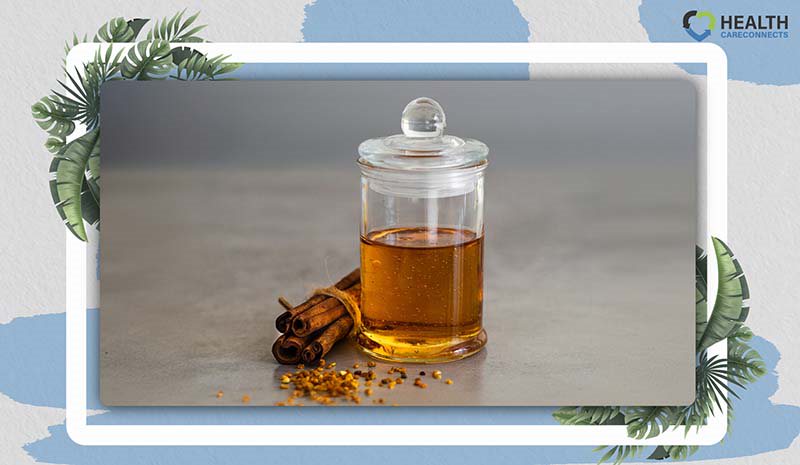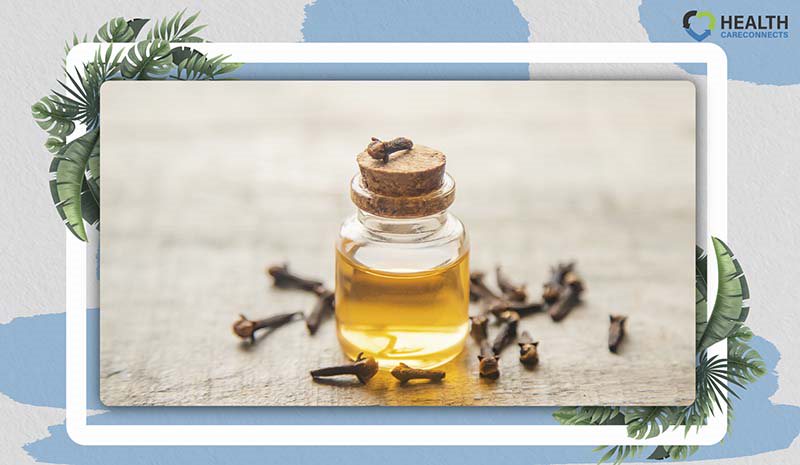As we continue to seek natural solutions for enhancing hair health, one ancient remedy stands out for its remarkable benefits. Is clove oil good for hair? This question has intrigued many, leading to a resurgence in its popularity.
At Health Connect, we seek to learn the rich history and proven effects of clove oil in hair care.
Join us as we explore how this traditional remedy can be a game-changer in your hair care routine, providing a natural alternative for maintaining lustrous, healthy locks.
Is Clove Oil Good for Your Hair?
Clove (Syzygium aromaticum) boasts a revered history in traditional Chinese medicine and Ayurveda. It has been valued since ancient times by cultures including the Greeks and Romans for its ability to enhance blood circulation and promote healthier hair growth.
Over the centuries, clove has become a global staple in hair care. It has been utilized in various forms such as clove-infused oils and treatments to combat dandruff, strengthen hair, and boost natural shine.
Today, clove oil continues to be a favored natural remedy in hair care routines, celebrated for its antioxidant, antimicrobial, and antifungal properties.

6 Uses of Clove Oil to Help Grow Hair
Here are six clove oil benefits for hair that you may not know.
Prevents Premature Graying
The appearance of gray hair can be disheartening for many. Premature graying, often occurred late twenties, can result from health disorders, hormonal imbalances, or unhealthy lifestyle choices such as smoking and alcohol consumption.
Clove oil contains unique elements that boost melanin production, the pigment responsible for your hair’s natural color. Its antioxidants combat oxidative stress, a common cause of premature graying.
For revitalized hair color, mix 3 tablespoons of eucalyptus oil with a teaspoon of clove oil. Massage this into your scalp and hair twice weekly.
Enhances Hair Shine
Dry, lifeless, and brittle hair indicates a need for nourishment. Clove oil can revitalize dull and rough hair strands, enhancing shine and reducing damage. It helps manage frizz and split ends, making hair smooth and manageable.
Regular treatments with clove oil enrich your hair with beneficial fatty acids and proteins, resulting in strong, shiny, and resilient hair. For optimal results, try an overnight anti-frizz treatment by blending warm coconut oil with clove oil. Apply to your hair and wash it out the following morning. This weekly regimen promises stunning, glossy hair.

Nourishes Scalp Health
Clove oil serves as a natural cleansing agent, delivering organic proteins to your scalp. It soothes itchy, irritated conditions, improving blood flow and hydration. Clove oil is famouse for its antimicrobial, antifungal, and antiseptic properties. Therefore, it effectively combats various scalp disorders, including seborrheic dermatitis and scarring hair loss.
Regular application detoxifies your scalp, removing grease, dirt, and impurities. Moreover, your scalp is perfumed with a refreshing aroma. A healthier scalp from consistent clove oil use promotes less hair breakage and supports new hair growth.
Reduces Hair Loss
Hair loss can result from weak follicles, harsh environmental conditions, and may signal serious health issues. While many home remedies offer slow results, clove oil provides a more immediate effect.
Applying a small amount directly to the scalp not only conceals bald spots but also strengthens hair, preventing unnecessary loss. Regular use of clove essential oil enhances hair volume and imparts a natural luster.
Promotes Hair Growth
When hair growth stalls, switching shampoos or resorting to expensive treatments often fails to provide lasting benefits. Clove oil is a natural alternative that promotes hair growth by supplying vital vitamins and minerals.
Massaging diluted clove oil into the scalp enhances circulation. And good blood circulation ensures adequate nutrient and oxygen delivery to hair follicles. For a boost in hair growth, consider a hot oil treatment or a homemade hair mask with clove oil.
Eliminates Dandruff
Dandruff is a common scalp issue, causing an uncomfortable itchy sensation and visible flakes that can affect confidence. While many shampoos provide only temporary relief, clove oil offers a lasting natural remedy.
Its antiseptic, anti-inflammatory, and antimicrobial properties effectively treat dandruff and soothe dry, irritated scalp conditions. Add 10 to 12 drops of clove oil to your regular shampoo for an effective dandruff treatment.

Utilizing Clove Oil for Hair Growth
Studies on cloves focusing on the natural ingredients inside them claim that these natural compounds themselves help improve hair and scalp health. With that said, there isn’t enough research on a particular method of application.
However, don’t let that stop you from using clove oil in your hair in your preferred manner. Common ways to use cloves for hair growth include making clove-infused oil, clove water rinse, and do-it-yourself (DIY) clove hair masks.
Here’s A Recipe for Clove-Infused Oil for Scalp Massage
Clove oil, when used for scalp massage, typically involves a carrier oil like coconut or jojoba oil infused with cloves. This mixture, when massaged onto the scalp, enhances blood flow to the hair follicles, which stimulates hair growth and increases the thickness of the hair.
To prepare clove oil:
- Begin by crushing one-half teaspoon of whole cloves using a mortar and pestle.
- Transfer the crushed cloves into a jar containing 4 ounces of a carrier oil such as coconut, jojoba, or olive oil.
- Seal the jar and allow the cloves to infuse in the oil for one week.
- After a week, strain out the cloves and pour the clove-infused oil into a clean bottle or jar.
- To use, gently massage this oil into your scalp with your fingertips. Let it sit for about 20 minutes before washing your hair with shampoo.
Does Clove Essential Oil Have Side Effects?
While clove oil can significantly benefit hair and scalp health, it must be used with caution to avoid potential side effects. It’s crucial to be aware of the following risks:
- Scalp Irritation: Sensitive individuals or those using undiluted clove oil might experience irritation such as redness, itching, or burning.
- Allergic Reaction: Those allergic to cloves could develop reactions, including hives, blistering, and intense itching and burning.
- Eye Irritation: Clove oil should be kept away from the eyes to prevent severe irritation.
- Respiratory Issues: Inhaling clove oil or clove-infused water may lead to respiratory distress.
Note:
- Always conduct a patch test by applying a small amount of clove oil to a less sensitive area of your skin. Observe any reactions over a week to ensure safety.
- Use clove products moderately to avoid drying out or irritating your scalp.
- Avoid eye contact with clove oil and rinse immediately if accidents occur.
- If irritation or discomfort arises, stop using the product immediately and consult a healthcare professional.
Conclusion
Is clove oil good for hair? It certainly is. Not only does it stop hair loss and dandruff, but it also promotes hair growth and luster. We hope clove oil will soon be present in your daily haircare routine, whether you use it as a rinse or a hair mask.
Ready to share with your friends how you used clove oil for hair growth? Any other hair problems you are still dealing with? Let us know in the comments below so we can help you better.
For more insights on maintaining healthy hair and overall wellness, explore our other blogs on Health Connect.

Dr. Joyce Slater: Your Guide to Informed Health Choices
Dr. Joyce Slater shines as a distinguished expert in the field of nutrition and public health. Contributing her vast expertise to HealthConnectbc, she embodies a deep-seated passion for enhancing public well-being. As a respected figure in her field. Dr. Slater’s academic journey and professional achievements are nothing short of inspirational.
Holding a significant position as a researcher and educator, Dr. Slater has delved deeply into the intricacies of food literacy and nutritional science. Her work, prominently featured in numerous esteemed scientific publications, underscores her dedication to expanding our understanding of food’s role in health and society.
At the heart of Dr. Slater’s professional ethos is a profound desire to positively impact individual lives through education and research. She often says, “Empowering people with the knowledge to make healthier choices is the most rewarding aspect of my work.” This principle is the cornerstone of her involvement with HealthConnectbc, where she strives to provide reliable and practical health advice.
Dr. Slater’s contributions to HealthConnectbc are multifaceted: academically, she offers insights into the complex world of nutrition and health, enhancing both public understanding and professional practices. Additionally, she is instrumental in guiding and inspiring the next generation of health professionals, thus fostering future excellence in the field.
Juggling rigorous research with her educational duties, Dr. Slater demonstrates an unwavering commitment to her profession. Her approachable nature and genuine concern transcend the confines of academia, touching the lives of everyone she interacts with. Dr. Slater looks forward to continuing her journey of discovery and education, dedicated to the ongoing improvement of public health and nutrition.
At HealthConnectbc, Dr. J. Slater is not just a contributor; she is a guiding light, dedicated to enlightening and motivating individuals towards a healthier and more informed lifestyle.
PUBLISHED ARTICLES
- Food literacy competencies: A conceptual framework for youth transitioning to adulthood (2018)
- Self-perceived eating habits and food skills of Canadians (2016)
- Challenges to acquiring and utilizing food literacy: Perceptions of young Canadian adults (2016)
- Socio-demographic and geographic analysis of overweight and obesity in Canadian adults (2009)
- Sustainable well-being: Concepts, issues, and educational practices (2014)

